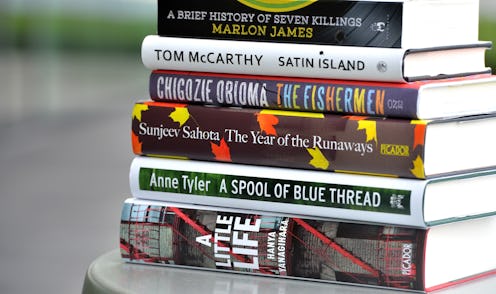Books
What Most Man Booker Prize Winners Have In Common
If you're looking to win a Man Booker Prize someday, there are some things to keep in mind, namely that you should probably be British man in his forties writing in third person. A new interactive tool helpfully called How To Win a Man Booker Prize breaks down the past winners by a number of categories, including details about both the author and the books. And it's pretty clear that when it comes to the English language's biggest literary prize, there are some pretty distinctive patterns.
The Man Booker Prize was first awarded in 1969, and since then it's become an institution. Unsurprisingly, therefore, it also reflects a lot of the institutionalized prejudices that exist in the literary world. Even though the prize is meant to recognize the best work written in English (and now even includes authors from outside the Commonwealth and Ireland), it tends to favor certain types of authors — and certain types of books — more heavily than others.
Some of these tendencies are relatively innocuous. For instance, the average length of a Booker Prize winner is about 370 pages, and in general your book is more likely to win if you use third person narration than first person. You're also more likely to win in your forties or fifties than you are in your thirties — and only one person, Eleanor Catton, has ever won while still in their twenties. Which makes sense; authors generally need time in order to achieve the level of skill a Man Booker win represents.
Also, somewhat hilariously, it turns out absolutely no Man Booker Prize winning novels have a Goodreads score above a 4.5. So even if you win the prize, that's no guarantee, I guess, that most people are going to agree that your novel is the best.
Some of the things revealed in this data, though, aren't so much interesting as discouraging. For example, Man Booker judges don't just tend to favor a certain length when it comes to novels, they also have preferences when it comes to subject matter. Over 80 percent of prize-winning novels have featured a male protagonist, and the most common setting for winners is the UK. Only eight have been set in India; only six have been set anywhere on the continent of Africa. None have been set anywhere in Asia that isn't India. Marlon James, who won the most recent award, was the first to win from the Caribbean.
Basically, if you're from someplace that isn't the UK and want to write about your home country, you're already at a disadvantage.
Even more discouraging, though, is the fact that the Man Booker judges also seem to favor certain types of authors — or, at the very least, are more favorable to certain literary perspectives. Fifty-six percent of winning authors have been British. Two-thirds have been male.
Which sucks for anyone who, you know, is never going to be those things.
You can find out more about Man Booker Prize winners by using this interactive tool.
Images: Flipsnack
